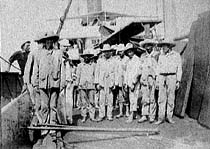Today in History: June 10
Guantánamo Bay

Havana, Showing the Entrance to the Harbor and Inner Harbor;
Taken from Cabanas Fortress Showing Morro Castle on the Extreme Right-Hand,
Havana, Cuba, copyright 1898.
Taking the Long View: Panoramic Photographs, 1851-1991

Hoisting the Flag at Guantánamo,
Guantánamo Bay, Cuba,
Edward H. Hart, photographer,
June 12, 1898.
Touring Turn-of-the-Century America: Photographs by the Detroit Publishing Company, 1880-1920
On June 10, 1898, U.S. Marines landed at Guantánamo Bay. For the next month, American troops fought a land war in Cuba that resulted in the end of Spanish colonial rule in the Western Hemisphere. Cuban rebels had gained the sympathy of the American public while the explosion and sinking of the U.S.S. Maine, widely blamed on the Spanish despite the absence of conclusive evidence, further boosted American nationalistic fervor.
Popular demand for intervention in the Cuban-Spanish conflict led Congress to pass resolutions demanding the withdrawal of Spanish armed forces from Cuba, authorizing U.S. aid to effect this, and promising American support for Cuban self-rule. Spain declared war against the United States on April 24, 1898, and the United States promptly replied with a counter-declaration.

Spanish Prisoners,
Guantánamo Bay, Cuba,
Edward H. Hart, photographer,
June 14, 1898.
Touring Turn-of-the-Century America: Photographs from the Detroit Publishing Company, 1880-1920
While Spain was unprepared to sustain a war in its distant territories, America was ready and eager to show off its military strength. The navy, under Admiral George Dewey's command, easily broke Spanish control of the Philippine Islands in an engagement at Manila Bay on May 1. American attention then turned to the liberation of Cuba.
On July 17, just five weeks after the landing at Guantánamo Bay, the Spanish forces under Admiral Pascual Cervera surrendered at Santiago. In the Treaty of Paris, the United States gained sovereignty of Guam, Puerto Rico, and the Philippines. Spain lost its colonial empire, and the United States emerged with greater influence in international affairs and an increased sense of national pride.
Learn more about the Spanish-American War in American Memory:
- Search the Today in History Archive on the term Spanish American War to find other important dates in the chronology of the war including February 15, April 25, July 1, and October 18.
- The Spanish-American War in Motion Pictures, 1898-1901 contains sixty-eight films of the first war in which the motion picture played a role. The films, which consist of actualities and reenactments, may be viewed chronologically in The Motion Picture Camera Goes to War: The Spanish-American War and the Philippine Revolution. This special presentation features brief essays that provide an historical context for the making of the films.
- The World of 1898, presented by the Hispanic Division, Library of Congress, provides resources and documents about the Spanish-American War, including an overview essay and a chronology of the war.
- Search on Guantanamo in Touring Turn-of-the-Century America: Photographs from the Detroit Publishing Company, 1880-1920 for more photographs of the 1898 conflict. Aboard the U.S.S. Texas, for example, see a Spanish mine taken up in Guantanamo Bay.
- Search on Guantanamo in Taking the Long View: Panoramic Photographs, 1851-1991 to view pictures of the U.S. Marines, still encamped at Guantánamo Bay in 1911.
- Search the collection The Spanish-American War in Motion Pictures, 1898-1901 to find a number of sound recordings of skits, music, and speeches about the war. For example, on April 20, 1889, just before war was declared, Buffalo Bill recorded a speech entitled "Sentiments on the Cuban Question" which urged U.S. intervention in Cuba.

Troops Making Military Road in front of Santiago,
Thomas A. Edison, Inc., copyright 1898.
The Spanish-American War in Motion Pictures